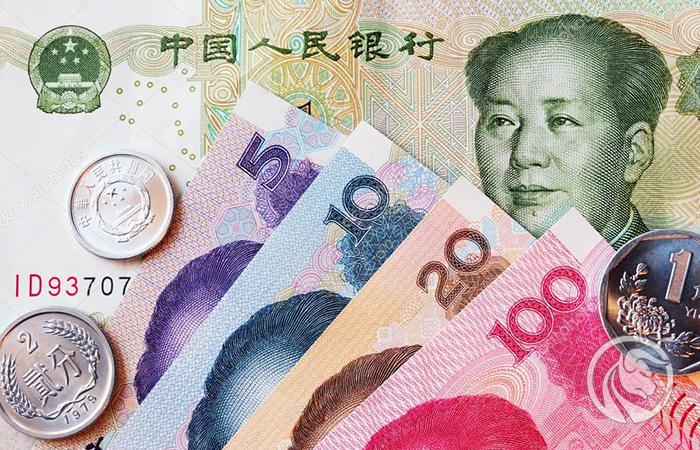The Chinese warn speculators: do not attack the yuan
The trade war between the US and China undoubtedly weakens - at least in its first phase - both countries and their currencies. However, the Chinese can lose more. This is a good opportunity for speculators who can profit from the depreciation of the Chinese yuan. However, it is already known that the risk will be greater than usual. The Chinese are not going to passively watch attacks on their currency.
We have been observing the fall in the value of the yuan since April. At that time, the dollar strengthened against the yuan by over 3,4 percent. This of course coincides with the intensification of the trade war and the increase of duties on goods imported by both countries. Although there is still a ray of hope for an agreement, but before it reaches, lowering the value of currencies is a relatively easy and definitely greedy target for currency speculators. The Chinese authorities decided, however, to warn them of excessive urges.
- The yuan selling speculators will suffer deep losses - warns Guo Shuqing, head of the Chinese banking and insurance market regulator.
Be sure to read: How much will we lose in the US-China trade war?
The Chinese can defend the currency
The Chinese do not joke, because the yuan already costs 7 dollars, which has been a psychological barrier for years. Even the sale from 2015 and 2018 year stopped at this price.
It is not the first time the Chinese have been defending the yuan and have been doing it effectively so far. In January, 2017 yuan sale in the nip in the bud by blocking access to currency liquidity for investors in Hong Kong. Thanks to this, deposits increased, which was a support for the yuan. This time they will not hesitate to defend the currency, and the money will certainly not lack them.
- China does not like the excessive imbalance in speculative positions on the yuan market, because, according to them, stabilization of the currency is crucial for the country's economic growth Says Alicia Garcia Herrero, Natixis chief economist for Asia-Pacific. He also reminds that the Chinese central bank has given the speculators a fire more than once.
George Soros - the man who won against the British pound, although someone else had the idea
The Chinese are trying to blow on the cold, because there have been cases in history that speculation with one country's currency caused an economic slump. The most famous history is of course the famous trade of George Soros. However, in order to understand exactly how one billion dollars are earned on one play, one must first know the entire transaction background, about which the world heard 22 on September 1992. It was then that one speculator could beat the central bank, not in a small country, but in England.
Soros had already been able to earn big money before. His hedge fund Quantum Fund in 30 years recorded 300 percent. profit. A real transaction, thanks to which a big profit in the colloquial language of traders is called "Soros trade", however, it brought him fame all over the world. Of course, not only positive, because for many people the word "speculator" has been an insult since that event. First things first.
ERM - fixed exchange rates of European currencies
In the twentieth century of the twentieth century, when the euro was not yet in existence, the UK successfully maintained a pound course at a fairly stable level to the German brand and other European currencies. When the exchange rate was greater than the 90 percent, the Bank of England undertook currency intervention and everything returned to normal.
It did not come back once. It was at that time that the speculative attack was carried out by George Soros and Stanley Druckenmiller, who was the inventor of the action. In September, the 1992 year saw a large depreciation of the US dollar against the German brand. The pound (recall: rigidly linked, among others, with the brand's price) has already been swaying, like a boxer after a series of blows. It did not suit the British government, because exports were settled in dollars. Under normal market conditions, a correction would take place, but it could not be done because the course had to stick to the previously defined range.
George Soros took advantage of this opportunity and spent $ 1 billion on the game against the pound. The UK government tried to fight, buying its currency, but it did not help much. The government decided to increase the interest rate from 10 percent. to 10 percent, and later 12 percent Despite this, the sale of the pound accelerated, taking on panic sizes. According to estimates, the United Kingdom lost a billion pounds on this 15 attack. One third of this amount went to Georg Soros' accounts.
As a result, the United Kingdom left the ERM system maintaining fixed exchange rates, and in fact it even burst it. However, it was not the worst. The United Kingdom was on the verge of a recession, more companies were going bankrupt, and real estate was cheaper day by day.
However, there are those who think that the black Wednesday of 1992 in the long term has left Great Britain for good. After the slowdown and introduced changes, the development of the British economy accelerated and outstripped the rest of Europe. In the years 1996-2005, the average GDP growth in the United Kingdom reached 2,7 percent, while in Germany it was lower by half, and in the Eurozone it did not exceed 2 percent.






















![Forex Club – Tax 9 – Settle tax on a foreign broker [Download the Application] Forex Club - Tax 9](https://forexclub.pl/wp-content/uploads/2024/02/Forex-Club-Podatek-9-184x120.jpg?v=1709046278)
![Trading View platform – solutions tailored to the needs of traders [Review] trading view review](https://forexclub.pl/wp-content/uploads/2024/03/trading-view-recenzja-184x120.jpg?v=1709558918)
![How to connect your FP Markets account to the Trading View platform [Guide] fp markets trading view](https://forexclub.pl/wp-content/uploads/2024/02/fp-markets-trading-view-184x120.jpg?v=1708677291)
![How to invest in ChatGPT and AI? Stocks and ETFs [Guide] how to invest in chatgpt and artificial intelligence](https://forexclub.pl/wp-content/uploads/2023/02/jak-inwestowac-w-chatgpt-i-sztuczna-inteligencje-184x120.jpg?v=1676364263)


![Izabela Górecka – “Success on the market depends not only on knowledge, but also on emotional stability” [Interview] Izabela Górecka - interview](https://forexclub.pl/wp-content/uploads/2024/04/Izabela-Gorecka-wywiad-184x120.jpg?v=1713870578)
![WeWork – the anatomy of the collapse of a company valued at $47 billion [WeWork, part II] wework bankruptcy story](https://forexclub.pl/wp-content/uploads/2024/04/wework-bankructwo-historia-184x120.jpg?v=1711729561)
![Adam Neumann – the man who screwed up Softbank [WeWork, part AND] adam neumann wework](https://forexclub.pl/wp-content/uploads/2024/04/adam-neumann-wework-184x120.jpg?v=1711728724)





![How to transfer shares to another brokerage office [Procedure description] how to transfer shares to another brokerage house](https://forexclub.pl/wp-content/uploads/2024/03/jak-przeniesc-akcje-do-innego-biura-maklerskiego-184x120.jpg?v=1709556924)
![The most common mistakes of a beginner trader - Mr Yogi [VIDEO] Scalping - The most common mistakes of a beginner trader - VIDEO](https://forexclub.pl/wp-content/uploads/2024/03/Scalping-Najczestsze-bledy-poczatkujacego-tradera-VIDEO-184x120.jpg?v=1711601376)
![Learning patience: No position is also a position - Mr Yogi [VIDEO] Scalping - Learning patience - No position is also a position - VIDEO](https://forexclub.pl/wp-content/uploads/2024/03/Scalping-Nauka-cierpliwosci-Brak-pozycji-to-tez-pozycja-VIDEO-184x120.jpg?v=1710999249)
![When to exit a position and how to minimize losses - Mr Yogi [VIDEO] Scalping - When to exit a position and how to minimize losses - VIDEO](https://forexclub.pl/wp-content/uploads/2024/03/Scalping-Kiedy-wyjsc-z-pozycji-i-jak-minimalizowac-straty-VIDEO-184x120.jpg?v=1710336731)




![VIX Index [Fear Index] - in search of market volatility [Video] vix fear index](https://forexclub.pl/wp-content/uploads/2021/12/vix-index-strachu-300x200.jpg?v=1638525622)













